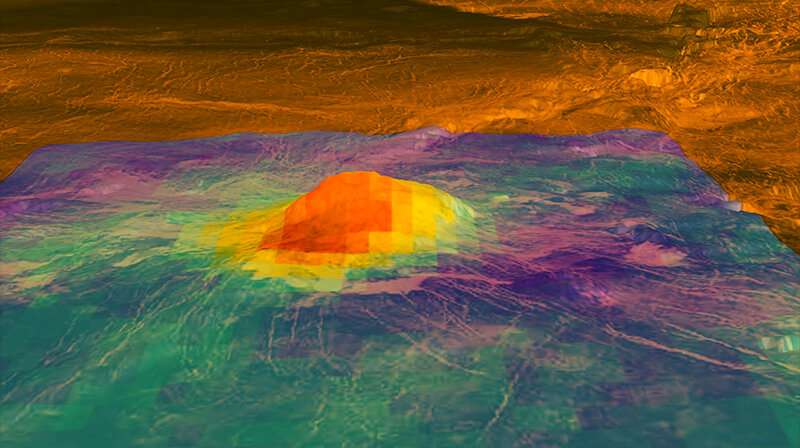
New research led by Universities Space Research Association (USRA) and published today in Science Advances shows that lava flows on Venus may be only a few years old, suggesting that Venus could be volcanically active today—making it the only planet in our solar system, other than Earth, with recent eruptions.
"If Venus is indeed active today, it would make a great place to visit to better understand the interiors of planets," says Dr. Justin Filiberto, the study's lead author and a Universities Space Research Association (USRA) staff scientist at the Lunar and Planetary Institute (LPI). "For example, we could study how planets cool and why the Earth and Venus have active volcanism, but Mars does not. Future missions should be able to see these flows and changes in the surface and provide concrete evidence of its activity."
Radar imaging from NASA's Magellan spacecraft in the early 1990s revealed Venus, our neighboring planet, to be a world of volcanoes and extensive lava flows. In the 2000s, the European Space Agency's (ESA's) Venus Express orbiter shed new light on volcanism on Venus by measuring the amount of infrared light emitted from part of Venus' surface (during its nighttime). These new data allowed scientists to identify fresh versus altered lava flows on the surface of Venus. However, until recently, the ages of lava eruptions and volcanoes on Venus were not well known because the alteratiion rate of fresh lava was not well constrained.
Dr. Filiberto and his colleagues recreated Venus' hot caustic atmosphere in the laboratory to investigate how the observed Venusian minerals react and change over time. Their experimental results showed that an abundant mineral in basalt—olivine—reacts rapidly with the atmosphere and within weeks becomes coated with the iron oxide minerals—magnetite and hematite. They further found that the Venus Express observations of this change in minerology would only take a few years to occur. Thus, the new results by Filiberto and coauthors suggest that these lava flows on Venus are very young, which in turn would imply that Venus does indeed have active volcanoes.
Explore further
Provided by Universities Space Research Association
Citation: Scientists find evidence that Venus has active volcanoes (2020, January 3) retrieved 3 January 2020 from https://phys.org/news/2020-01-scientists-evidence-venus-volcanoes.html
This document is subject to copyright. Apart from any fair dealing for the purpose of private study or research, no part may be reproduced without the written permission. The content is provided for information purposes only.
https://news.google.com/__i/rss/rd/articles/CBMiRmh0dHBzOi8vcGh5cy5vcmcvbmV3cy8yMDIwLTAxLXNjaWVudGlzdHMtZXZpZGVuY2UtdmVudXMtdm9sY2Fub2VzLmh0bWzSAUVodHRwczovL3BoeXMub3JnL25ld3MvMjAyMC0wMS1zY2llbnRpc3RzLWV2aWRlbmNlLXZlbnVzLXZvbGNhbm9lcy5hbXA?oc=5
2020-01-03 21:38:40Z
52780537886490
Bagikan Berita Ini














0 Response to "Scientists find evidence that Venus has active volcanoes - Phys.Org"
Post a Comment